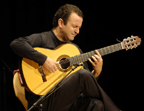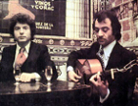Welcome to one of the most active flamenco sites on the Internet. Guests can read most posts but if you want to participate click here to register.
This site is dedicated to the memory of Paco de Lucía, Ron Mitchell, Guy Williams, Linda Elvira, Philip John Lee, Craig Eros, Ben Woods, David Serva and Tom Blackshear who went ahead of us.
We receive 12,200 visitors a month from 200 countries and 1.7 million page impressions a year. To advertise on this site please contact us.
|

|
|
ROMERITO!!
|
You are logged in as Guest
|
|
Users viewing this topic: none
|
|
Login  | |
|

   
jrabbani
Posts: 192
Joined: Jun. 28 2006
From: Los Angeles

|
 ROMERITO!! ROMERITO!!
|
|
|
your inbox is full!
so heres my response:
To a degree, I believe the terms flamenco and gypsy are synonymous with one another. However, as I am sure you are well aware of, flamenco has evolved to where the two terms are almost becoming dichotomous to each other. I agree with hood, with regards to throwing yourself into a musical culture in order to understand it fully, but to what degree? I see many schools in Spain advertising to learn this folk art. So if I go to one of these private schools, and cough up 5 grand, does that make me ’flamenco’? Or do I have to be born into it? What if I learn from PDL? I think I recommended Blackening’s “How musical is man.” He addresses some of these issues by looking at the role of music in a society and culture. Check out Victor Turners 3 stages of passage (borrowed from Van Gennup’s words) and his takes on the liminal stage…I’m sure we could apply his theory to some of your interests. I would argue that in order for one to become a good/knowledgeable aficionado, one must understand cante. But it is still a grey area as far as what the person needs to know in order to identify with flamenco. What if I just know compas? What would I be then? To many, that means I understand flamenco. So if I understand flamenco does that inherently make me a flamenco? Or how much of culture does an outsider need to comprehend in order to be “accepted” or even tolerated? Have you read Clifford Geertz’ “Balinese Cockfight”? This work discusses how he, Geertz, came to be accepted by the Balinese people by running from the police with them. It’s an interesting read as far cultural and social acceptance. We also need to look at the individual’s epistemology and, to an extent, phenomenology. I think if we were to study one’s own phenomenological experience, it would be easier to understand where they are coming from and how they can fit into the ever so fleeting culture of flamenco. What I am curious about is why a certain form of music emerges at a particular time? How does a musical structure form in a particular society and how it may have, at some point in time, become a global phenomenon? One of my flamenco friend’s asked Jason Mcguire when he thinks a non-Spaniard will become famous in flamenco. His response: not for a very long time. OK I’m rambling, got to run to class…hope we can continue this.
Best
juben
|
|
|
|
REPORT THIS POST AS INAPPROPRIATE |
Date Apr. 23 2007 18:55:05
 |
|

   
Ricardo
Posts: 14801
Joined: Dec. 14 2004
From: Washington DC

|
 RE: ROMERITO!! (in reply to Doitsujin) RE: ROMERITO!! (in reply to Doitsujin)
|
|
|
quote:
?
Ok.. You´ll get the doctorate for shure...

Man that is funny! But I like these types of discussions, I wish you guys would open it up.
I think if you can do palmas well, not just BS'ing, meaning you could do palmas by yourself for a solo dancer, solo guitarist,solo singer, or in a juerga, you cross the line from aficionado to flamenco, as far as terminology goes. It is not enough to "understand compas". You have to demonstrate something. The problem is you will find many aficionados who do palmas, or sing, or play guitar BADLY, and want to be considered more than aficionados...if you get my meaning. And this goes for Spaniards, gitanos, guiries, payos, etc...everyone who is into flamenco. Of course you will also find very humble aficionados who can sing REALLY good, or dance or play guitar, but are too shy to really participate or consider what they do, real "flamenco".
Ricardo
|
|
|
|
REPORT THIS POST AS INAPPROPRIATE |
Date Apr. 25 2007 4:59:48
 |
|

   
Jasmine_27
Posts: 67
Joined: Mar. 26 2007
From: Tokyo

|
 RE: ROMERITO!! (in reply to Guest) RE: ROMERITO!! (in reply to Guest)
|
|
|
Hi - I'm starting oud lessons next Sunday, and though I know little about music theory, my teacher (also a Kevin!) told me that solea is based on the hijaz mode. There must be other correlations as well, so I'll keep you posted. There's also a web site (maqamworld .com) that has written and aural sound bites of scales and maqam-based improvisations that might be interesting for you to listen to. Cameron Powers, a Colorado-based oud musician, has also compiled an introductory text with written and aural examples of 31 of the most common scales used in Arabic music. If you're interested in attending a workshop, Simon Shaheen organizes a one-week Arabic music retreat at Mount Holyoke College in Massachusetts every August. This is for experienced musicians only, so I don't qualify by a long shot, but you'd get the chance to get some hands-on experience with this ancient tradition.
I'm also interested in cante, and am learning Spanish with an eye to appreciating the lyrics more myself. I'd like to know more about Hispano-Arabic poetry and song traditions, but in re-reading Don Pohren's Lives and Legends of Flamenco tonight, I found a passage concerning Indian musicians and dancers in Cadiz (c. 500 BCE) and the impact of sacred temple dance on Spanish religious celebrations. Pohren's book was originally written in 1964, so more recent scholarship may shed some light on this aspect of flamenco, but he's also compiled a fairly comprehensive synopsis of many of the most famous gitano cantaors - all the way from El Planeta to 1988, complete with translations of many lyrics. Some academicians deride Pohren's book for his strident opinions, but I love it! It's really a classic and I always feel like he's lived what the ivory-tower academics can only theorize about. Maybe it's wanna-be jealousy! I just wish he'd write a second update and share his views on contemporary flamenco as well.
Anyway, it'd be really fascinating to trace the Arabic and/or Indian influences on flamenco music and song. I just wish I had the linguistic and musical skills to jump into a project like this - it's really exciting to explore things like this!
I'd like to see your bibliography, and if you ever offer an on-line class, I'll be the first to sign up!
|
|
|
|
REPORT THIS POST AS INAPPROPRIATE |
Date Apr. 29 2007 12:53:46
 |
|

   
Estevan
Posts: 1936
Joined: Dec. 20 2006
From: Torontolucía

|
 RE: ROMERITO!! (in reply to jrabbani) RE: ROMERITO!! (in reply to jrabbani)
|
|
|
Aha, the ethnomusicologists are coming out of the woodwork!
This is important stuff being discussed, and it shouldn't be in the "Off Topic" department (or even the ROMERITO sub-department - with all due respect  ) )
The insider-outsider theme is such a never-ending one (and one that I'll bring over to our earlier discussion of Indian music and flamenco, if I ever get around to it), and a source of great stories, like the famous Geertz example you mentioned.
As for 'cantometrics', I heard about it back in pre-history, probably from Tim Rice - maybe you know him, Juben? I recall something about a correlation between vocal tone and sexual repression. (Of course, there's a bit more to it than that, but these are the kinds of things that stick in the mind...)
Here's an article that seems to give a useful synopsis, including:
" the example which first let the cat out of the cantometrics bag; 'Folk Song Style and Culture', Introduction. During a major collecting exercise in Spain in 1953, Lomax noticed that the intensity of local sexual prohibition was reflected in the vocal tones adopted by his singers. Thin, harsh, high pitched and piercing, with intense emotional delivery, in the proscriptive south  . Broader, softer, lower pitched and more relaxed in the comparatively permissive north . Broader, softer, lower pitched and more relaxed in the comparatively permissive north  . A recording trip to Italy, two years later, found the pattern repeated." . A recording trip to Italy, two years later, found the pattern repeated."
Discuss amongst youselves 
Cantometrics: Song and Social Culture
|
|
|
|
REPORT THIS POST AS INAPPROPRIATE |
Date May 9 2007 19:39:40
 |
|

   
jrabbani
Posts: 192
Joined: Jun. 28 2006
From: Los Angeles

|
 RE: ROMERITO!! (in reply to Estevan) RE: ROMERITO!! (in reply to Estevan)
|
|
|
estevan
did you earn your degree in ethno as well?
haven't heard of Rice, i'll look into him though. and I do agree with -ologies having a tendency to "reach." I even find that in my field of study (anthropology). and the wasabaugh book is interesting, insightful on certain levels, but interesting nonetheless. but this does not i mean i agree or disagree with him.
and Kevin, continue with hood and merriam, they have some wonderful ideas about music.and have you read john blacking's "how musical is man?" another good read for anthro/ethno.
also, i don't know if you've dabbled into other social theory, but Pierre Bourdieu and his "aristocracy of culture" is an excellent read and theory. he equates a person's wealth to their culture (high or low culture, and music is a big part of it).
finally, check out kay kaufman shelemay's "the ethnomusicologist, ethnographic method and the transmission of tradition."
ok back to the books!
juben
|
|
|
|
REPORT THIS POST AS INAPPROPRIATE |
Date May 10 2007 3:00:10
 |
|

   
jrabbani
Posts: 192
Joined: Jun. 28 2006
From: Los Angeles

|
 RE: ROMERITO!! (in reply to Guest) RE: ROMERITO!! (in reply to Guest)
|
|
|
hey kev, hows the course work going? i was in the library at ucla doing some research for a professor, and stumbled across a book by Gilbert Chase "The Music of Spain" from 1953. Have you heard of it? I flipped through it and saw some interesting photos...anyways this is what he has to say about "spanish idioms"
"the product of a process of fusion and amalgamation that reached its culmination in the second half of the 18th century and the early part of the 19th. The elements so fused and amalgamated, largely under the influence of the scenic tonadilla, were threefold: first, there was the element of pure folk music,. essentially of rural origin; secondly, the element of urban street music, essentially popular but more heterogeneous in texture; and, thirdly, the conventional apparatus of instrumental and vocal technique, by this time developed to a point that might be called "modern.""
|
|
|
|
REPORT THIS POST AS INAPPROPRIATE |
Date Oct. 30 2007 18:48:18
 |
|
 New Messages New Messages |
 No New Messages No New Messages |
 Hot Topic w/ New Messages Hot Topic w/ New Messages |
 Hot Topic w/o New Messages Hot Topic w/o New Messages |
 Locked w/ New Messages Locked w/ New Messages |
 Locked w/o New Messages Locked w/o New Messages |
|
 Post New Thread
Post New Thread
 Reply to Message
Reply to Message
 Post New Poll
Post New Poll
 Submit Vote
Submit Vote
 Delete My Own Post
Delete My Own Post
 Delete My Own Thread
Delete My Own Thread
 Rate Posts
Rate Posts
|
|
|
Forum Software powered by ASP Playground Advanced Edition 2.0.5
Copyright © 2000 - 2003 ASPPlayground.NET |
0.09375 secs.
|


 Printable Version
Printable Version









 )
)  . Broader, softer, lower pitched and more relaxed in the comparatively permissive north
. Broader, softer, lower pitched and more relaxed in the comparatively permissive north 
 New Messages
New Messages No New Messages
No New Messages Hot Topic w/ New Messages
Hot Topic w/ New Messages Hot Topic w/o New Messages
Hot Topic w/o New Messages Locked w/ New Messages
Locked w/ New Messages Locked w/o New Messages
Locked w/o New Messages Post New Thread
Post New Thread